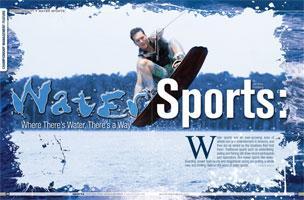
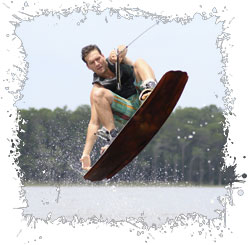 Water sports are an ever-growing area of athleticism and entertainment in America, and they are as varied as the locations that host them. Traditional sports such as waterskiing, sailing and fishing still draw record participants and spectators. But newer sports like wakeboarding, power boat racing and dragonboat racing are putting a whole new, and thrilling, face on the world of water sports.
Water sports are an ever-growing area of athleticism and entertainment in America, and they are as varied as the locations that host them. Traditional sports such as waterskiing, sailing and fishing still draw record participants and spectators. But newer sports like wakeboarding, power boat racing and dragonboat racing are putting a whole new, and thrilling, face on the world of water sports.
Not limited, as you might guess, to locales with oceans or vast lakes, water sports are springing up all over America, and some in places you might least expect.
What Are Water Sports?
The world of water sports is a broad category, and it includes such a wide variety of sports that, except for their one common denominator -water- they hardly look related. This vast variety of sports can be performed on equally varied bodies of water, so there's pretty much a water sport for every location with some kind of liquid landscape. All it takes is finding the right fit.
Many traditional water sports are also Olympic sports. These include "aquatics" -swimming, diving and water polo - canoeing, kayaking, rowing and sailing. Other sports, such as surfing and waterskiing, are Olympic-recognized sports, while still others, like wakeboarding, are currently under petition to be recognized by the Olympic committee.
Olympic sports generate a whole year of events on the state, regional and national level, but Olympic qualification is just the beginning. Thousands of athletes, who simply compete for the joy of the experience rather than Olympic dreams, populate hundreds of non-Olympic water sports events in the U.S. each year as well.
Additionally, some of the most popular sports, for both participants and spectators, have nothing to do with Olympic competition. Fishing is a prime example.
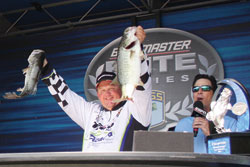 Decatur, Alabama, located 30 minutes outside of Huntsville, has recently put itself at the center of the fishing tournament world. Using more than $450,000 in proceeds from the Hospitality Association's self-imposed $1.50 room occupancy tax, Decatur developed Ingalls Harbor, a park and harbor located on 21 acres of the Tennessee River.
Decatur, Alabama, located 30 minutes outside of Huntsville, has recently put itself at the center of the fishing tournament world. Using more than $450,000 in proceeds from the Hospitality Association's self-imposed $1.50 room occupancy tax, Decatur developed Ingalls Harbor, a park and harbor located on 21 acres of the Tennessee River.
"We got Ingalls dedicated two years ago and from that point we have probably booked at least 40 tournaments," said Tami Reist, president of the Decatur-Morgan County Convention & Visitors Bureau.
In June, Ingalls Harbor hosted the Bass Anglers Sportsman Society's (BASS) Bassmaster Elite Series tournament, a qualifying event for BASS's culminating event, the three-day Bassmaster Classic. One hundred eight anglers came, and ESPN showcased the event.
"We can actually launch 12 boats at a time at Ingalls, and it's an amazing sight," said Reist. "It was just beautiful to see all those anglers out there, and it was a great opportunity to showcase our community."
Pools, Pools, Pools
Even communities that have no natural bodies of water can still host a world-class, not to mention profitable, water sport event. All it takes is a focus on facilities.
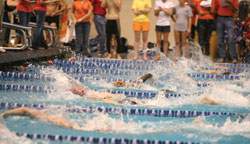 Buffalo, New York is probably best known for its majestic Niagara Falls. But while it's not as well-known, the Aquatics Center the Burt Flickinger Center on the City Campus of Erie Community College is a boon to Buffalo sports. One of the top aquatics centers in the country, the Burt Flickinger Center went up in 1993 as part of the World University Games. Since then the Center,which houses an eight-lane, 50 meter competition pool with two one-meter diving boards and two three-meter diving boards, has played host to a wide range of aquatics events, such as US Open, NCAA and YMCA championships. This June, Buffalo hosted Olympic hopefuls at the USA Diving National Preliminaries.
Buffalo, New York is probably best known for its majestic Niagara Falls. But while it's not as well-known, the Aquatics Center the Burt Flickinger Center on the City Campus of Erie Community College is a boon to Buffalo sports. One of the top aquatics centers in the country, the Burt Flickinger Center went up in 1993 as part of the World University Games. Since then the Center,which houses an eight-lane, 50 meter competition pool with two one-meter diving boards and two three-meter diving boards, has played host to a wide range of aquatics events, such as US Open, NCAA and YMCA championships. This June, Buffalo hosted Olympic hopefuls at the USA Diving National Preliminaries.
An event done Buffalo-style is about more than just a world-class facility. It's also about the strong ties between community sports leaders and events.
"If it wasn't for the strength and involvement of the diving coach at the University at Buffalo, Karla Helder, it would be much more difficult for us to attract such high-caliber events," said Chuck Giglia, national sales manager for the Buffalo Convention & Visitors Bureau. "She is very community-minded and willing to work to bring events to our community and make them successful."
Across the Midwest plains, another of America's top aquatic centers awaits just outside Seattle, Washington. The Weyerhaeuser King County Aquatic Center hosts more than 50 events annually, including the Olympic Trials and, this year,the NCAA men's swimming and diving championships. According to a recent economic study, events at the Weyerhaeuser have brought more than $7.5 million to the Kings County area.
Water, Water Everywhere
Some communities are blessed with a few natural features that make them perfect hosts for one of water sports' various event. Whether it's a river, a lake, a bay or an ocean shorefront, many cities around the country are making the most of whatever water they have to bring events to their area.
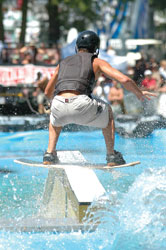 Some of these places aren't readily associated with water, but they actually have a vibrant presence in water sports. Atlanta's Cobb County has one foot in the city and the other in north Georgia's lake country. Lake Alatoona in Ackworth, Georgia., proved the perfect host for one of water sports' newer cousins, wakeboarding. A combination of surfing and waterskiing, wakeboarding involves a boarder riding a short surfboard while being pulled behind a boat or a vehicle driven along the water's edge. Ackworth hosted one of wakeboarding's top-tier events, the Pro Wakeboard Tour, which brings together nearly 100 of the sport's top athletes for a five-city tour.
Some of these places aren't readily associated with water, but they actually have a vibrant presence in water sports. Atlanta's Cobb County has one foot in the city and the other in north Georgia's lake country. Lake Alatoona in Ackworth, Georgia., proved the perfect host for one of water sports' newer cousins, wakeboarding. A combination of surfing and waterskiing, wakeboarding involves a boarder riding a short surfboard while being pulled behind a boat or a vehicle driven along the water's edge. Ackworth hosted one of wakeboarding's top-tier events, the Pro Wakeboard Tour, which brings together nearly 100 of the sport's top athletes for a five-city tour.
Wakeboarding has a strong following of dedicated participants, but it is also a big draw for spectators, making Lake Alatoona's Dallas Landing the ideal location.
"The park setup around the lake is perfect for viewing so any sport that needs a spectator viewing area is perfect for Lake Alatoona," said Mike Bower, national sales manager for the Cobb Convention & Visitors Bureau. "Also, the city loves the event and the community loves it; they really get behind it. They even shut down the streets for a festival for all the riders who come in for the event."
Another event, the CEO Fly Fishing Challenge, seeks out the best fly fishing spots and brings along some of the world's best fly fishermen along for the ride.
CEO Challenges organizes sports competitions all over the world with the goal of finding out who is the world's best CEO in a variety of sports. It all started in 2001 with the CEO Ironman Challenge, which ran in conjunction with the Lake Placid Iron Man event. Seven years later, the company's programs include a number of events including marathons, car racing, sailing and in 2008, fly fishing.
At the CEO Fly Fishing Challenge, CEOs from around the world pair up with Team USA Fly Fishing anglers for coaching and competition.
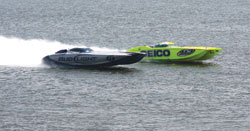 "We always go with the best of the best, and we're very proud to be working with Team USA Fly Fishing," said Ted Kennedy, president of CEO Challenges. "Also a good portion of the money raised will go back to Team Fly Fishing USA so that they can travel to the World Championships in Scotland."
"We always go with the best of the best, and we're very proud to be working with Team USA Fly Fishing," said Ted Kennedy, president of CEO Challenges. "Also a good portion of the money raised will go back to Team Fly Fishing USA so that they can travel to the World Championships in Scotland."
Jay Buchner, president of Fly Fishing Team USA, developed the rules for this Challenge and will oversee the competition. The inaugural CEO Fly Fishing tournament will be held this October in one of fly fishing's most legendary spots: Cody, Wyoming. But with interest in the event running high, Kennedy anticipates many future events, possibly even more than one event per year.
Not Your Average Water Sport
Another relatively new water sport is bringing the rush of high-speed car racing to the water. The Offshore Superseries (OSS) is a traveling speedboat race, open to any location with a body of water at least five miles in circumference.
"We hold 8 to 10 races per year, and we go wherever people write the check," said Ron Polli, OSS president. "It's a little like bringing the circus to town."
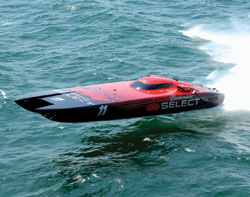 Cities with the right waterscape pay OSS a set fee, in addition to any cities services and park rental fees needed, to bring the Series to town. OSS brings the boats and the racers, and the host city or organization is free to set up ticketing, branded souvenirs, parking fees, etc., to reap financial rewards from the event. So does it pay off? An economic impact study for Ft. Meyers beach, where OSS held a recent event, revealed a $5 million economic impact.
Cities with the right waterscape pay OSS a set fee, in addition to any cities services and park rental fees needed, to bring the Series to town. OSS brings the boats and the racers, and the host city or organization is free to set up ticketing, branded souvenirs, parking fees, etc., to reap financial rewards from the event. So does it pay off? An economic impact study for Ft. Meyers beach, where OSS held a recent event, revealed a $5 million economic impact.
"We get a huge response along Gulf coast," said Polli. "Forty to fifty thousand people attend."
In top of ticket sales, communities benefit from the traditional CVB mantra, heads and beads, but they also get an unexpected perk: all OSS races, and the communities that host them, are featured on FOX Sports Nationwide.
If visually stunning water events seem like the right fit for your community, you might also check out the world's fastest-growing water sport: dragonboating. An ancient Chinese sport dating back more than 2000 years, it is a relatively new sport in the United States, with popularity growing every year. Also, unlike most water sports, dragonboating actually allows participants with no expertise to get involved, making the entire event a community happening.
"All you need are people who are willing to get in the water and have some fun," said Aaron Soroka, director of business development for Great White North, a "one-stop shop" for dragonboat racing and event production. "You don't need to own paddles, boats or life jackets. Show up in clothes that can get a little wet and get ready to have fun. All the equipment comes with us."
Many dragonboat festivals, like the Philadelphia International Dragon Boat Festival, invite members of the community as well as established dragonboat teams to participate. Because dragonboating times all teams in the first few races,and then pits teams with similar initial times against one another in the rest of the event's races, the races remain fun and competitive for all participants -not just the best- as well as spectators.
The Philadelphia Flying Phoenix women's team participates in their home event as well as various other events throughout the year. At more than 70 members rowing on 3 different crews, they're ahead of the curve on this growing sport.
"We started in 2003," said Anne Matthews,team coach. "Some of us had been part of another dragonboat team and the coach quit, and we decided to continue on ourselves. That's where our name comes from, the Flying Phoenix. We had to build ourselves back up."
The Philadelphia Flying Phoenix are a great example of the sport's rapid growth. In 2003, they had 20 team members, but today they are up to 90, with ages ranging from 28 to 72.
With new teams popping up all over America, and a handful of dragonboat festivals creating interest and building a strong base of fans, now might be the perfect time to get your own festival underway.
Bring on the Waves
Water sports are an area of sports events that shows continuous strong growth, not just because of the ongoing strength of traditional sports, but also thanks to the passion and energy of new and extreme water sports.
And it's not just conventional waterfront cities that can benefit from this healthy growth trend. With a focus on exceptional facilities and a little creative thinking, CVBs and event planners across the country can make water sports a part of nearly any community's events.

